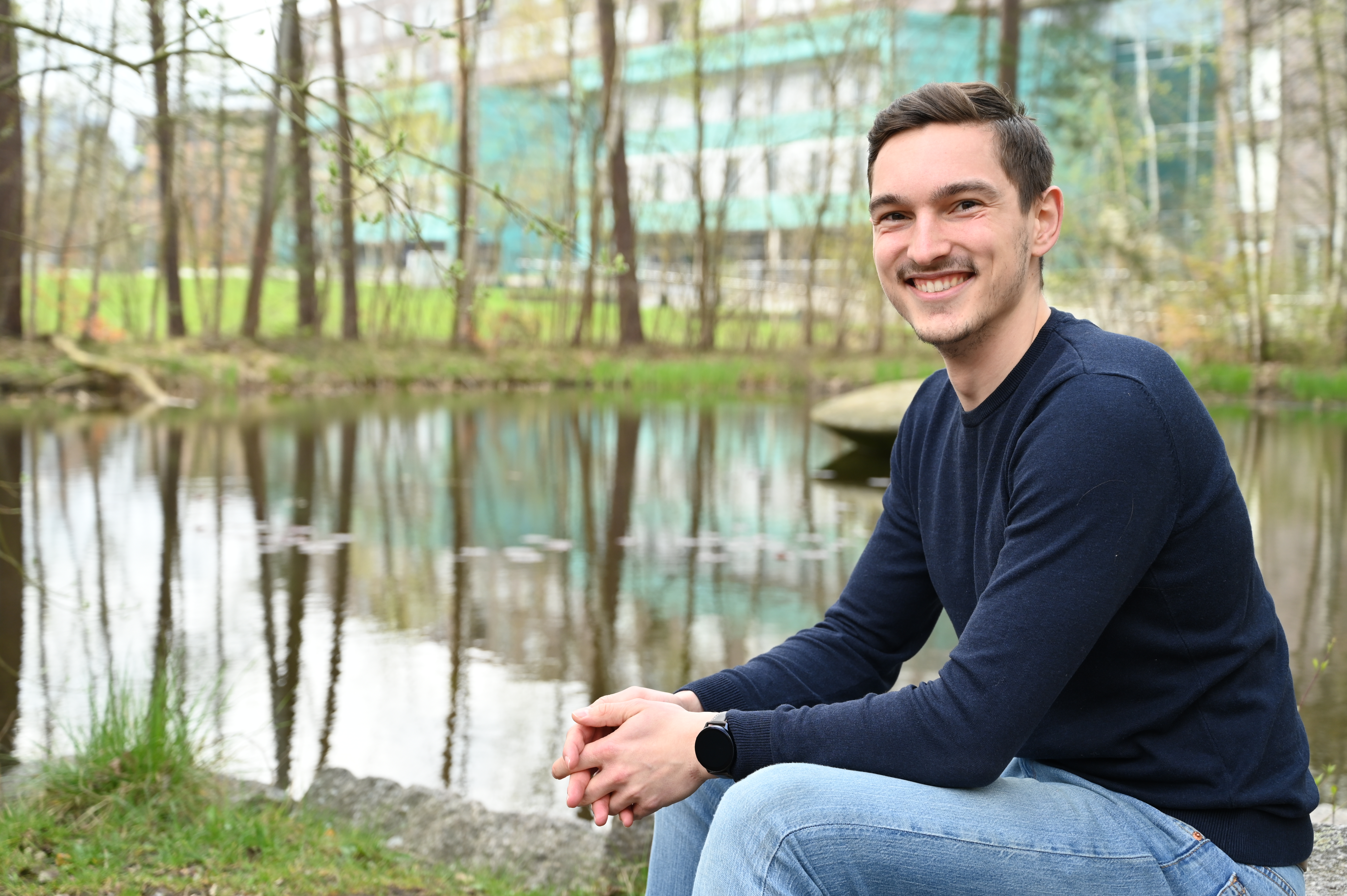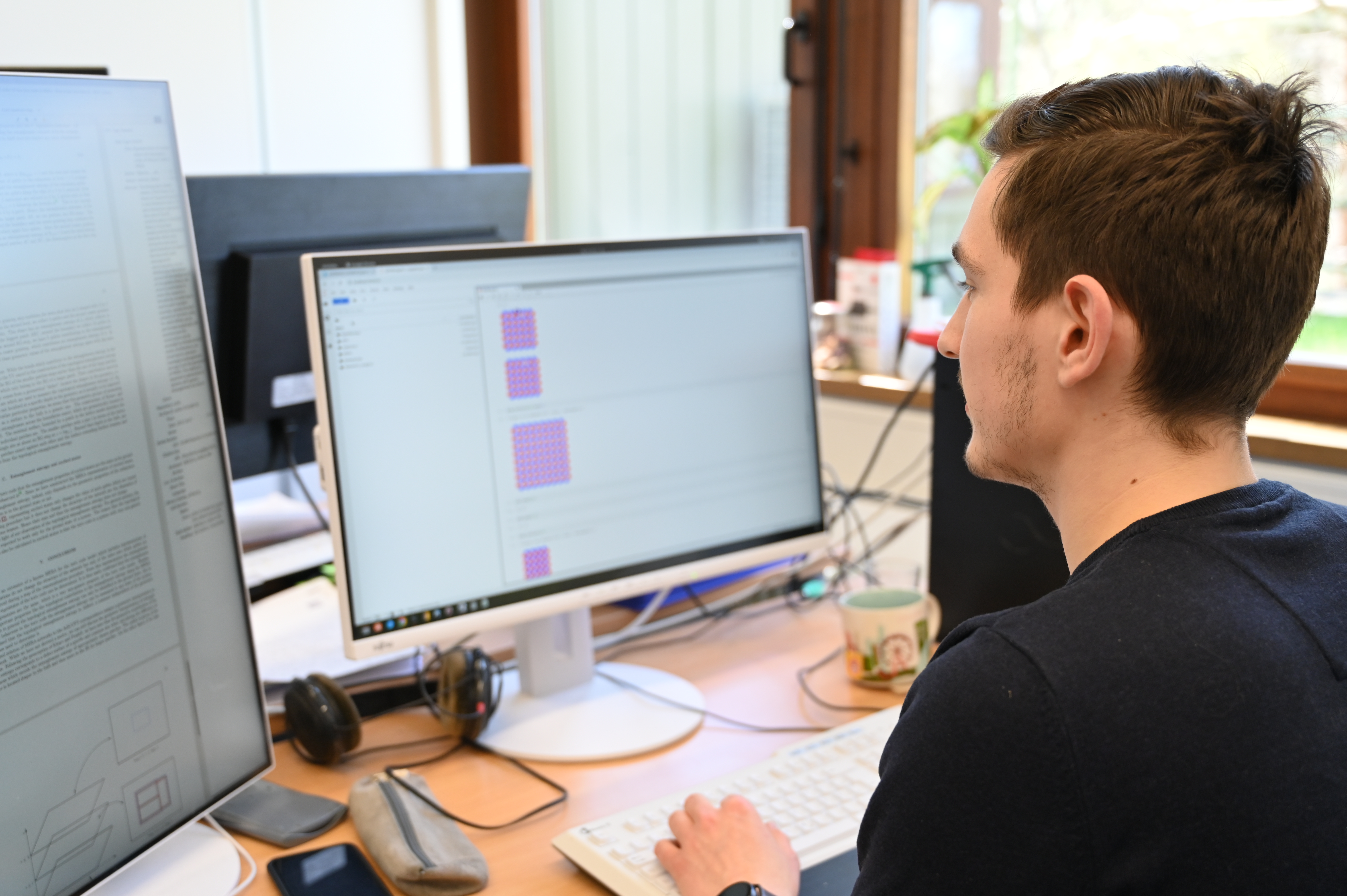"I feel like I'm in the right place at the right time"
Programming with optimism for the distant future
As a child, Leon Sander wanted to be an astronaut; today he is a theoretical physicist with great passion. For him, his research is a way to express himself while contributing a small part to a big development.
By Veronika Aechter
It's 23 October 2019, and Leon Sander is sitting in Prof. Michael J. Hartmann's office for a preliminary interview for his bachelor's thesis. Suddenly, the phone won't stop ringing. Journalists are calling to get a statement from Hartmann on the just-published Google paper on quantum supremacy, in which the Bavarian quantum researcher was involved. "That's when I had the feeling that I was in the right place at exactly the right time," Leon recalls. He still has that feeling today – by now he is working on his doctorate at Hartmann's Chair of Theoretical Physics at the Friedrich Alexander University of Erlangen-Nuremberg.
On a table in the corner of his office, which Leon shares with two other doctoral students, a small blue espresso machine catches your eye, looking a bit like a robot of days gone by. Insiders know immediately what model it is and that it suggests Leon is a coffee nerd. The coffee scale and hand grinder next to it reinforce this suspicion, which the physicist can laughingly confirm. When making coffee, too, you can experiment with the variables until the result comes out right. Much like in Leon's research.
Leon has enjoyed physics since his school days. This was also due to a good teacher who came up with exciting topics for his only very small physics course in high school. That's also how he first came into contact with quantum physics at school – although it was this area, of all things, that was his biggest weakness back then in high school, he recounts with a laugh. "I think I was a little resistant to it at first. I thought there must be a better explanation for these effects," says the now 24-year-old looking back. But that's exactly what fascinated him in the end and drew him to the subject, he says.
Coding as self-realization
In his own research, Leon deals with machine learning models and neural networks. "More specifically, I'm researching Quantum Convolutional Neural Networks (QCNNs). This is a relatively new concept," the Ph.D. student explains. So far, QCNNs have been applied primarily to one-dimensional spin chains; Leon is working on applying them to two-dimensional systems.
He sits down in front of his computer and briefly types a few lines of code into the command line. "I'm trying to find a sequence of procedures by which properties can be efficiently read out of a complex quantum system. A QCNN helps by recognizing the property in question, so to speak, and developing it in such a way that the information can be read out with far fewer measurements than traditionally. To do this, I plot two-dimensional qubit lattices and apply operations to them," Leon says, summarizing his research project. He jokes with his girlfriend that he's been playing four-in-a-row ever since she looked over his shoulder in his home office. And indeed: Leon presses Enter again and his grids appear on his screen, squares of red and blue circles that clearly remind of the game.

Leon Sander, 24
Position
Ph.D. student
Institute
FAU – Chair for Quantum Theory
HAT
Degree
Physics
Leon conducts research on Quantum Convolutional Neural Networks (QCNNs). He wants to find procedures that can efficiently detect and read out properties of quantum systems. Such procedures shall facilitate the characterization of complex quantum systems in the future.

When asked if theoretical physics wasn't, well, maybe a little dry, the previously guarded doctoral student perks up: "There's a lot of creativity in my work! I'm incredibly free in what I can try out," he says emphatically, eyes gleaming. For him, this was a form of self-realization. After all, that is what was so great about physics, that there are so many ways to solve a problem. And if a problem can't be solved so easily? "Quite cliché: I'm actually very good at finding new ideas in the shower," Leon laughs.
Back to machine learning: How does quantum machine learning actually differ from classical machine learning? First and foremost, Leon explains that classical machine learning already works very well. With ChatGPT and networks like Stable Diffusion, this area is getting a lot of attention right now. The advantage of these networks is that they can be trained very well.
"Quantum neural networks (QNNs) have a lot of potential, they are very expressive," explains the Ph.D. student. "But the crux is that they are hard to train," he qualifies. This is where the folded neural networks, or QCNNs, that Leon is researching come into play. "QCNNs have a friendlier parameter landscape than QNNs. They just have this trainability that the nonconvolutional networks lack." So-called barren plateaus, regions in the parameter landscape where parameters have no effect on output and cannot be optimized, do not exist in QCNNs compared with QNNs.
However, Leon continues, one problem currently exists: "The systems get very large very quickly. I'm looking at very unrealistic systems that are far off in terms of size." Working with ideas whose applicability is not yet foreseeable is something Leon describes as an interesting feeling. It also involves a good dose of optimism that he's not running in the wrong direction, he says. But anyway – after all, he says, you also have to look at systems to know what doesn't work.
"I'm proud to be here".
To know whether you're on the right track in the first place, exchange with colleagues is crucial. It's hard to get off on the right foot on your own, says the doctoral student. Finding out quickly who can support you with a problem is a tip he would give to all prospective doctoral students. It helps that he has already written his bachelor's and master's theses in the group in which he has been working on his doctorate since December 2022.
He emphasizes the different ways of thinking that come together at his chair: "There are people who are very good with pen and paper. There are people who are very visual thinkers. Others, I would count myself among them, are good at simulation and coding. To benefit from all these directions is the most important thing." In addition, there is the knowledge exchange that the Munich Quantum Valley network can offer beyond his own department, which he appreciates. In addition, he says, there is also a certain pride in participating in the Bavarian project.
And pride in his own work? That's what he feels when he thinks back to the presentation of his master's thesis in front of around 70 people at the DPG conference, he says after a moment's reflection. Representing his own research in front of others, standing up for his ideas and exposing himself to feedback is quite a challenge, he thinks. "It sounds contradictory at first, but at the same time I really like it. The feeling after a presentation is always great."
A small part in the big picture
Not knowing where the road will lead and yet being sure to contribute to a significant development is how Leon ultimately sums up the motivation for his current research. Quantum computing may be a huge hype at the moment, but Leon acknowledges the potential for major world changes. But for now, he sees his own career aspirations as more down-to-earth: "To get through his doctorate well," he says, laughing.
What's next? He'll have to see. "If I stay in research, the next step is definitely to go abroad. During my studies, Corona unfortunately stood in my way." He could well imagine France or Belgium – his girlfriend is French, so the language barrier is not a problem. "The beauty of quantum physics is that the field is so open. Where I end up – I'm quite flexible about that."
Published 21 July 2023; Interview 19 April 2023